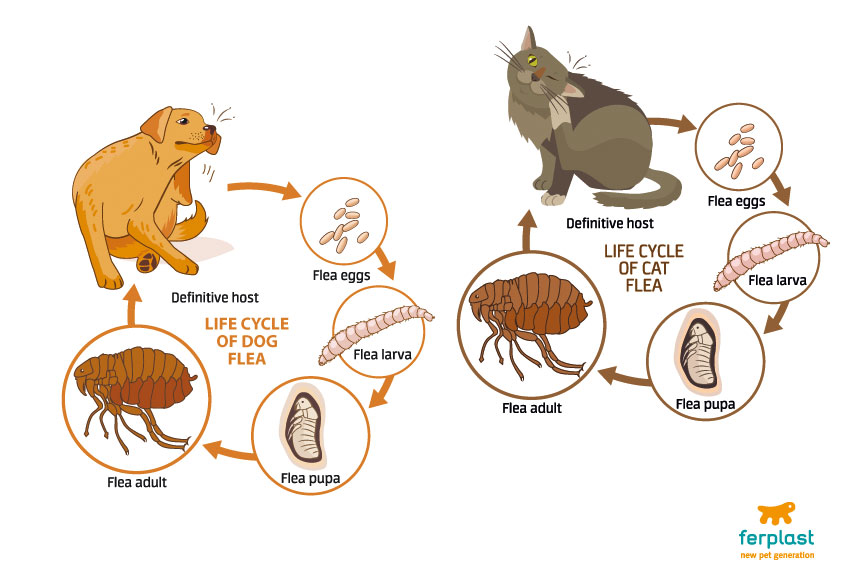Woah! Amazing natural flea remedies
Do you know that fleas can survive year round in your house? Give them heat and humidity, and your going to have an itchy dog or cat 🙁
Fortunately there are a number of things you can do beside the toxic insecticides. One of the big principles is keeping the skin strong and less reactive. Especially important for allergies!
My dog Tula is getting these every single day:
…a good quality Omega 3 Fatty Acid Supplement.
Dr. Jones’ Ultimate Omega 3 Formula for Dogs and Cats is 100% natural, full spectrum, organic Antarctic Krill Oil, rich in EPA, DHA, Phospholipids and Astaxanthin.
Guaranteed to be naturally preserved and toxin – free: Dr Jones’ ULTIMATE Omega 3 Formula


Natural Flea and Tick Preventives, plus Dr. Jones’ new Homemade Flea Spray!
SOLUTION:
BAD-SMELLING HERBS – Aromatic herbs may help repel fleas. Pennyroyal and catnip are most effective. A scientific study isolated a compound in catnip that was extremely effective in repelling fleas. Purchase some catnip at your local pet supply store and regularly give it to your cat during flea season.
CHINCHILLA DUST – This is correctly called “diatomaceous earth, " which consists of the skeletons of microscopic algae. It can be purchased in pet supply stores, but be sure it is the kind meant for pets, not the glass type used in swimming pool filters. It can be used on your pet and in the house. Apply it weekly during flea season, vacuuming three days after applying.
NATURAL CONTROL IN YOUR YARD – Nematodes are microscopic worms that prey on the larvae and pupae of fleas. They can be purchased at most garden stores; a small canister contains one hundred million little worms. Follow the label directions, spraying them on the damp bushy areas in your yard.
MAKE YOUR PET TASTE BAD – Garlic and brewer’s yeast have been advocated as a way of repelling fleas. In my experience it only seems to help a small number of dogs, but it is worth a try. Garlic is not safe to give to cats long term. For a ten-pound dog, give one-fourth teaspoon of garlic and one-fourth tablespoon of brewer’s yeast daily.
CEDARWOOD OIL SPRAY – A relatively nontoxic natural substance, this has been proven effective in the eradication of infestations in pets. Be cautious in spraying any type of essential oil on cats or small dogs; only lightly mist them and then use a flea comb to spread the spay around.
DEHUMIDIFY – Humidity is vital for flea survival. Flea eggs need humidity of 75 percent to hatch; flea larvae need 50 percent humidity to survive. For example, in places with adequate humidity, 20 percent of the eggs survive. In dry areas with low humidity, less than 5 percent of the eggs survive. Using a dehumidifier in your home will go a long way in stopping the flea cycle.
ALTERNATIVE HERBAL SOLUTION:
NATURAL PYRETHRINS:FEVERFEW FLOWERS – These flowers are where the first flea sprays came from. Get a handful of the flowers, steep in hot water, cool, and pour over your dog or cat. This will temporarily paralyze the fleas.
Dr Jones’ BEST EVER Natural Flea and Tick Repellent Spray (for dogs and cats!)
Neem Oil -Neem oil is a carrier oil extracted from the neem (Azadirachta indica), a tree native to Sri Lanka, Burma, and India. Azadirachtin is a powerful insecticide. Anti-inflammatory, antiseptic, antifungal, antihistamine, and fever reducing properties. It is safe when applied topically, and diluted to 2% or less.
Cedarwood Oil – Essential Oil steam distilled from Cedar trees. Considered one of the most effective and safe holistic flea/tick repellents. Safe when applied topically and diluted to 2% or less.
Coconut oil – A great topical anti-inflammatory, and has documented Insect Repellent properties.
Witch Hazel with Aloe – Witch Hazel is very helpful for skin disorders, and Aloe is a wonderful natural anti-inflammatory.
Castile Soap – This is the all natural soap. It has 2 benefits; 1st the soap itself will kill fleas, and secondarily the soap acts as an emulsifier so the oils in this recipe (Neem, Cedarwood and Coconut) mix with the non oil fluids and spray evenly.
Flea Spray
- Witch Hazel with Aloe – 1/2cup (125ml)
- Coconut Oil – 2 tablespoons (30ml)
- Neem Oil -2 ml (2 droppers)
- Cedarwood Oil – 40 drops
- Castile Soap – 1 tablespoon (15ml)
- This recipe ensures that the Neem oil and Cedarwood Oils are at 1% dilution, meaning safe for topical use on dogs/cats
- Shake well each time before spraying.
- Use liquid coconut oil, and you still may need to warm this if your house is cold and the neem oil becomes firm.
- Lightly mist your dog/cat, then use a flea comb to spread it through the fur.
- Can be applied 2-3 times/week for a dog, but best to only use once a week for cats.

Best Wishes,
Dr Andrew
P.S. In my opinion, it is better to try and control the critters without the insecticides – the less toxic stuff you expose your dog and cat to, the better.
P.P.S. The Omega 3 Fatty Acids are just great all-around supplements to give your dog or cat. Yes they are very important for skin disease, but also helpful for many common conditions… .
- Inflammatory Skin Disease
- Osteoarthritis
- Heart Disease
- Kidney Failure
- Cognitive dysfunction
- Feline Asthma
- Recurring pancreatitis
My naturally preserved and toxin free Omega 3 supplement is here